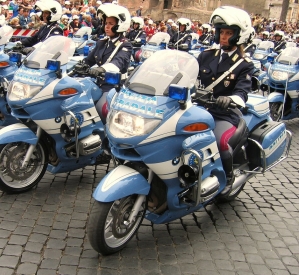
Three Muslims from Tunisia were detained this month in Italy for beating and robbing a Christian convert from Islam because he attended a church, according to a watchdog group.
The Public Prosecutor’s Office at the Court of Perugia on April 13 issued the pre-trial detention orders based on aggravating circumstance of religious discrimination for the attack that took place on Nov. 12, according to the Observatory on Intolerance and Discrimination Against Christians in Europe (OIDACE).
The unidentified, 28-year-old victim reportedly told officials that, on an evening walk with a friend in the Ponte San Giovanni District of Perugia, the Muslims accused him of “frequenting the church of Christians” and then threatened, beat and kicked him. The Christian broke free and escaped after the assailants tore a necklace from him.
The General Investigations and Special Operations Division confirmed the religious motive behind the attack, which noted that he had converted to Christianity in the past few months and attended a local Catholic church. His participation in Christian celebrations angered some Muslim Tunisians in the country, according to the division.
Italian news site ANSA reported a hospital source saying at that time that the injuries would take a month to heal. The victim, a legal immigrant, complained to the police after receiving hospital treatment.
The three Muslims were reportedly remanded to custody because of the seriousness of the alleged offenses, previous police records and the risk factor of further attacks.
The suspects remain under investigation for issuing threats, personal injury and robbery committed with the aggravating circumstance of religious discrimination, according to the OIDACE.
Two of the original assailants allegedly approached the Christian in a shop within the same neighborhood just five days later, Nov. 17. They demanded that he withdraw the police complaint and stop attending “the Catholic church.”
A Wider Problem
Anja Hoffmann, OIDACE executive director, said that “apostasy” is punishable by death under sharia (Islamic law).
Converts in parts of Muslim communities in Europe face “widespread rejection and hostility,” she said.
“Converts with a Muslim background are, therefore, the group of Christians most likely to experience verbal aggression and even physical violence in Europe,” Hoffmann told Christian Daily International. “This problem has become particularly visible during the refugee crisis, leading to human rights organizations and politicians across Europe to call for measures, including separate housing, due to reports of discrimination and violent aggressions against Christian converts in asylum shelters.”
Countries with high migration rates such as Italy are especially affected by these issues, Hoffmann said.
“These incidents call for a firm commitment of politicians and religious leaders to safeguarding the right to freedom of religion for all, including the right to change one’s religion, as enshrined in international human rights law,” she said.
A Reuters report on Oct. 20 found that sea migrant arrivals to Italy had doubled from 2022 to 2023, with 140,000 migrants arriving. Of these arrivals, some 91 percent of the migrants arriving on Italian shores came from Tunisia.
Tunisia ranked No. 33 on Open Doors’ 2024 World Watch List of the countries where it is most difficult to be a Christian. A 2022 report on constitutional changes in the country said Tunisian Christians “experience high pressure in every area of life.”
“This is particularly true for believers who’ve converted from Islam, because they could face severe levels of community and familial pressure,” the report added.
Converts from Islam remain the most vulnerable Christian group in Europe generally, according to OIDACE.
The European Centre for Law and Justice (ECLJ) published a report in July 2022 on the issue. Entitled, “The Persecution of Ex-Muslims Christians in France and in Europe,” the ECLJ called for “counseling assistance” to be given to Muslims wanting to change their religion in Europe.
Dedicated hotlines and emergency relocation services are also needed, the ECLJ noted.
“For all European countries…we found that almost all the associations that deal with persecuted Christians on other continents are little or not at all concerned with persecuted Christians in Europe,” the report stated. “It is certain that the situation for an ex-Muslim who became a Christian is much more difficult in Pakistan or Nigeria. Yet, the situation is becoming really worrying in Europe, and awareness has to be raised in the world of associations for the defense of Christians.”
The ECLJ also highlighted difficulties of converts being unwelcome in some Christian communities.
“There is a great sadness and incomprehension among converts that they are not better welcomed by the religious communities they join,” the report stated. “Whether among Catholics or Protestants, the quality of the reception of a convert from Islam varies according to whether the pastor or priest is informed and sensible to the situation of converts from Muslim backgrounds.”





